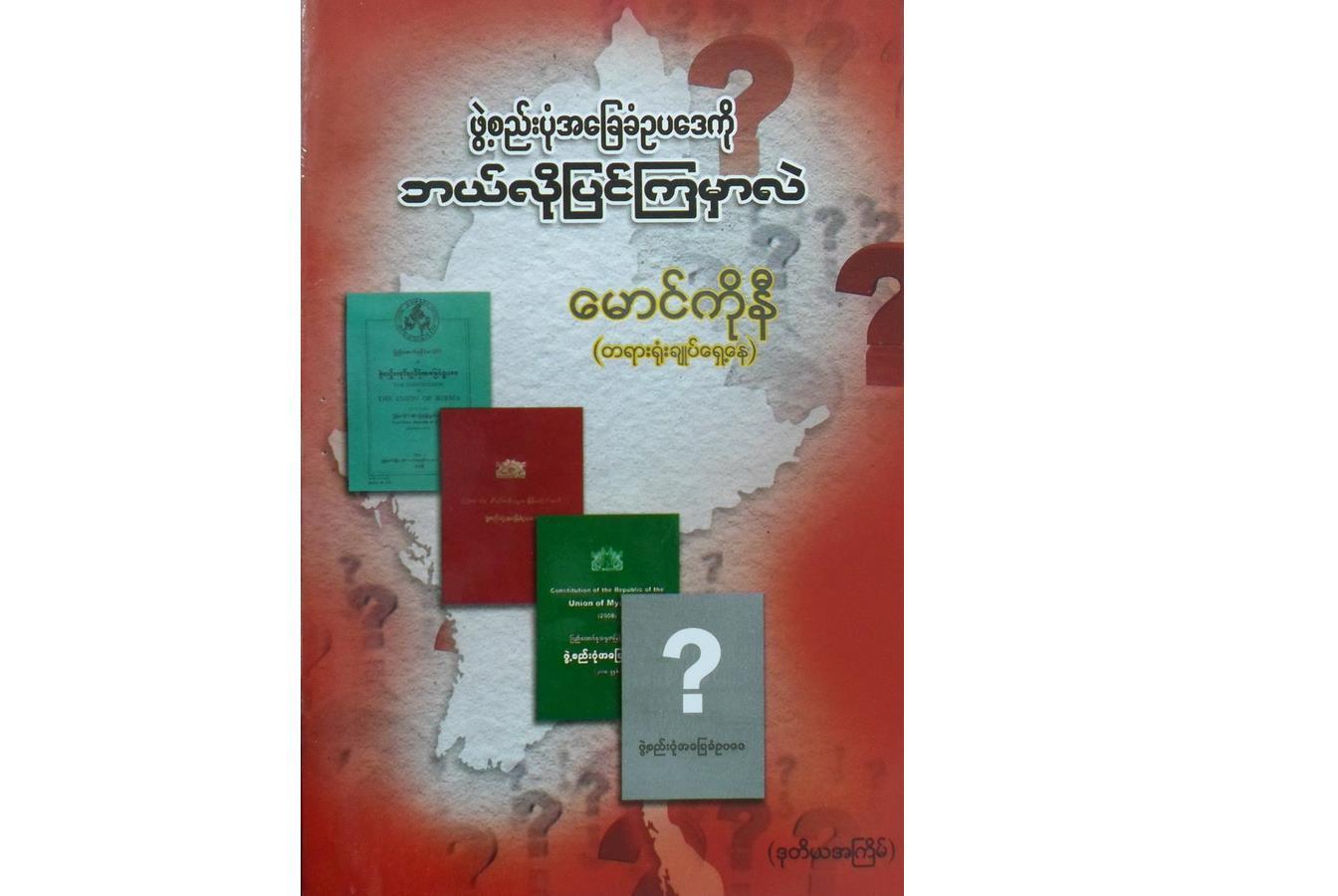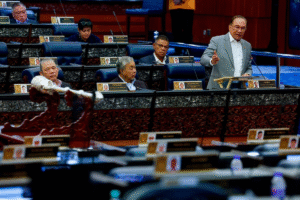Preface
This draft document, titled “Proposed Constitutional Rights for Myanmar Muslim Minorities”, is a preliminary contribution toward shaping a future democratic and inclusive Constitution for Myanmar. As its author, I, Dr. Ko Ko Gyi @ Abdul Rahman Zafrudin, humbly acknowledge that I am neither a legal expert nor a scholar of Islamic jurisprudence, but a medical doctor by profession.
My intention is simply to lay a foundational stone—offering a structured outline of rights based on international human rights standards and comparative constitutional practices, particularly with reference to the Singapore, Malaysia and Thai Constitution’s protections for its Muslim and Christian minorities. I sincerely hope that learned Muslim lawyers, religious scholars, and practitioners of Islamic law will take this draft forward, refining and expanding it into a comprehensive legal framework worthy of our diverse and pluralistic nation.
May this humble effort inspire further collaboration in the pursuit of justice, equality, and peaceful coexistence for all minorities in Myanmar.
This draft is guided by:
- Universal Declaration of Human Rights (UDHR)
- International Covenant on Civil and Political Rights (ICCPR)
- Conventions on Minority Rights
- Federal protections seen in countries like Malaysia (Sabah/Sarawak), Singapore
- Historical context of Myanmar’s diverse Muslim communities
PROPOSED CONSTITUTIONAL RIGHTS FOR MYANMAR MUSLIMS & MINORITY RELIGIOUS GROUPS
Introduction: Why We Need These Protections
Myanmar, as a majority-Buddhist nation, has historically struggled with protecting the rights and dignity of its religious and ethnic minorities, particularly Muslims—whether Rohingya, Bamar Muslims, Pathi, Panthay, Kaman, or others.
- Democracy must be based on “Rule of Law”, not “Rule by Law.” True democracy includes justice, fairness, empathy, tolerance, and loving-kindness for all.
- If majority rule suppresses minorities by legal force, democracy degenerates into mobocracy.
- Myanmar’s post-colonial history shows weaponization of religion and nationalism by both civilian and military leaders, leading to systemic discrimination and atrocities.
- General Aung San rightly rejected making Buddhism a national religion, as recalled in his reprimand of Deedoke U Ba Cho during the AFPFL conference.
- Sayagyi U Razak once declared that Myanmar Muslims did not want “minority rights,” because they saw themselves as part of the national fabric. That trust was ultimately betrayed.
This proposal calls for strong, enforceable constitutional rights for Muslims and other minorities—framed in modern legal language and backed by international norms.
PROPOSED CONSTITUTIONAL FRAMEWORK
I. CITIZENSHIP & IDENTITY RIGHTS
- All ethnic and religious minorities, including Muslims, must be legally recognized as full citizens.
- Right to be registered under a unified identity system with:
- Birth Certificates
- National Registration Cards (NRD)
- Family Registration Lists
- Passports
- Right to self-identify ethnically as: Myanmar Muslim, Rohingya, Pathi, Kaman, Pashu, Panthay, Myaedu, etc.
- Race/religion must not be a barrier to legal documentation, citizenship, or national inclusion.
II. CIVIL & POLITICAL RIGHTS
- Full voting rights at all levels (local to national).
- Right to contest elections and hold office at:
- Local councils
- Township and district administrations
- National and regional parliaments
- Right to reserved parliamentary representation in proportion to population (similar to India, Malaysia, Nepal and Singapore etc..
- Protection from religious discrimination in:
- Government services
- Civil service, military, police, education sectors
III. RELIGIOUS & CULTURAL RIGHTS
- Right to freely practice and propagate religion without interference.
- Legal protection to:
- Build new mosques and madrasas
- Repair, renovate, or expand existing religious buildings
- Teach own languages (Arabic, Urdu, Burmese, English and Pali), Maths, Science, IT and religious curriculum
- Right to Islamic personal and family law:
- Marriage, divorce, inheritance
- Protected as customary law since pre-colonial and colonial times
IV. EDUCATION & EMPLOYMENT EQUALITY
- No discrimination in:
- University admissions
- Government scholarships
- Civil service entry or promotions
- Armed forces and police recruitment
- Establishment of:
- Muslim professional associations
- Muslim student and youth organizations
V. SOCIAL & HUMANITARIAN RIGHTS
- Right to form:
- Islamic welfare societies
- Old-age homes
- Orphanages
- NGOs for humanitarian work
- Rights to cemeteries with dedicated mosque areas.
VI. PROTECTIONS AGAINST HATE SPEECH & VIOLENCE
- Criminalize:
- Hate speech
- Religious hate summons
- Distribution of hate literature
- Ban extremist organizations like Ma Ba Tha and all similar groups.
- Enforce anti-discrimination laws:
- Ban on “Muslim-Free Zones” in housing, towns, villages
- Prevent landlords refusing to rent/sell to Muslims
VII. ECONOMIC EQUALITY & MOBILITY
- Equal right to:
- Start businesses
- Migrate and settle in any part of Myanmar
- Own property and land without discrimination
- Ensure equal access to:
- State tenders
- Trade licenses
- Financial support and microfinance
VIII. FEDERAL MODELS TO EMULATE
- Malaysia (Sabah/Sarawak) – Cultural autonomy and revenue-sharing with federal government, especially in:
- Language, education, and religion
- Oil and gas revenues for local development
- Singapore – Multi-religious protection within a secular legal framework
- Clear constitutional prohibitions against religious or racial discrimination
CLOSING NOTE
Muslims of Myanmar are not guests or outsiders. They have:
- Fought alongside the Bamar against colonialism.
- Served in parliaments, cabinets, and civil service.
- Lived peacefully as part of Myanmar’s social fabric for centuries.
It is time the Constitution recognizes their rights with the dignity, protection, and equality they deserve—so that Myanmar may finally become a united, democratic, and just country for all.
မြန်မာနိုင်ငံ မွတ်စလင် လူနည်းစုများအတွက် အဆိုပြုထားသော ဖွဲ့စည်းပုံအခြေခံဥပဒေဆိုင်ရာ အခွင့်အရေးများ (မူကြမ်း)
(Proposed Constitutional Rights for Myanmar Muslim Minorities (Draft))
နိဒါန်း
ဤ “မြန်မာနိုင်ငံ မွတ်စလင် လူနည်းစုများအတွက် အဆိုပြုထားသော ဖွဲ့စည်းပုံအခြေခံဥပဒေဆိုင်ရာ အခွင့်အရေးများ” စာတမ်းမှာ မြန်မာနိုင်ငံ၏ အနာဂတ် ဒီမိုကရေစီနှင့် စုံလင်စွာပါဝင်ခွင့်ရှိသော ဖွဲ့စည်းပုံအခြေခံဥပဒေပုံစံအား ပုံဖော်ရန် ကနဦးအထောက်အကူပြုလိုသည့် မူကြမ်းတစ်ခုဖြစ်ပါသည်။ ဤစာတမ်းရေးသားသူ အကျွန်ုပ် ဒေါက်တာကိုကိုကြီး (အဗ္ဗဒူလ်ရာမန်ဇာဖရူဒင်) သည် ဥပဒေပညာရှင် လည်းမဟုတ် အစ္စလာမ်မစ်တရားဥပဒေပါရဂူ လည်းမဟုတ်ဘဲ သာမန် ဆေးပညာ ဆရာဝန် တစ်ဦး သာဖြစ်ကြောင်း ဝန်ခံအပ်ပါသည်။
ဤမူကြမ်း၏ ရည်ရွယ်ချက်မှာ နိုင်ငံတကာလူ့အခွင့်အရေးစံနှုန်းများ၊ အထူးသဖြင့် စင်ကာပူ၊ မလေးရှားနှင့် ထိုင်း ဖွဲ့စည်းပုံအခြေခံဥပဒေများတွင် ၎င်းတို့၏ မွတ်စလင် နှင့် ခရစ်ယာန်လူနည်းစုများအား ကာကွယ်ပေးသည့် ပုံစံများကို ကိုးကား၍ နှိုင်းယှဉ်လေ့လာပြီး စနစ်တကျဖွဲ့စည်းထားသော အခွင့်အရေးများ၏ အခြေခံအုတ်မြစ်ကို ချပေးရန်သာဖြစ်ပါသည်။ ဤမူကြမ်းအား အသိပညာရှိ မြန်မာ မွတ်စလင် ဥပဒေပညာရှင်များ၊ ဘာသာရေးပညာရှင်များနှင့် အစ္စလာမ်မစ် တရားဥပဒေပါရဂူများက ဆက်လက်တည်းဖြတ်ပြီး ကျွန်ုပ်တို့နိုင်ငံ၏ မတူကွဲပြားသော လူ့အဖွဲ့အစည်းနှင့် လိုက်လျောညီထွေရှိသည့် ပြည့်စုံခိုင်မာသော ဥပဒေရေးရာအဆောက်အအုံအဖြစ် မွမ်းမံပေးကြမည်ဟု ရိုးသားစွာမျှော်လင့်ပါသည်။
ဤကြိုးပမ်းမှုကလေးသည် မြန်မာနိုင်ငံရှိ လူနည်းစုအားလုံးအတွက် တရားမျှတမှု၊ ညီမျှမှုနှင့် ငြိမ်းချမ်းစွာ အတူယှဉ်တွဲနေထိုင်ရေးအတွက် နောက်ထပ်ပူးပေါင်းဆောင်ရွက်မှုများကို မြေတောင်မြှောက်ပေးနိုင်ပါစေဟု ဆုတောင်းပတ္ထနာပြုအပ်ပါသည်။
ဤမူကြမ်းပြုစုရာတွင် လမ်းညွှန်အဖြစ် ထည့်သွင်းစဉ်းစားထားသည့် အချက်များ –
- လူ့အခွင့်အရေး ကြေညာစာတမ်း (UDHR)
- နိုင်ငံသားနှင့် နိုင်ငံရေးအခွင့်အရေး သဘောတူညီချက် (ICCPR)
- လူနည်းစုအခွင့်အရေးဆိုင်ရာ သဘောတူစာချုပ်များ
- ဖက်ဒရယ်စနစ်ဖြင့် ကာကွယ်ပေးသည့် နိုင်ငံများ၏ ပုံစံများ (ဥပမာ – မလေးရှား (ဆာဘား/ဆာရာဝါခ်)၊ စင်ကာပူ၊ ဘင်္ဂလားဒေ့ရှ်)
- မြန်မာနိုင်ငံရှိ ကွဲပြားသော မွတ်စလင် အသိုင်းအဝိုင်းများ၏ သမိုင်းဆိုင်ရာ နောက်ခံအခြေအနေ
အခန်း (၁) – ဤ လူနည်းစုများအတွက် ကာကွယ်မှုများ လိုအပ်ပုံ အကြောင်းပြချက်
ဗုဒ္ဓဘာသာကို အများစုကိုးကွယ်သည့် နိုင်ငံဖြစ်သော မြန်မာနိုင်ငံသည် သမိုင်းတစ်လျှောက် ဘာသာရေးနှင့် လူမျိုးရေးလူနည်းစုများ၊ အထူးသဖြင့် ရိုဟင်ဂျာ၊ ဗမာ မွတ်စလင်၊ ပသီ၊ ပန်းသေး၊ ကမန် စသည့် မွတ်စလင် အုပ်စုများ၏ အခွင့်အရေးနှင့် ဂုဏ်သိက္ခာကို ကာကွယ်ရာတွင် အခက်အခဲများရှိခဲ့ပါသည်။
- ဒီမိုကရေစီစနစ်သည် (Rule by Law) “ဥပဒေဖြင့် အုပ်ချုပ်မှု” သို့မဟုတ် “မတရားသောဥပဒေမျိုးစုံကိုခုတုံးလုပ်အသုံးပြုပြီးဖိနှိပ် အုပ်ချုပ်မှု” မဟုတ်ဘဲ (Rule of Law) ခေါ် တရားမျှတမှုနှင့် တန်းတူညီမျှမှုရှိသော ခွဲခြားဖိနှိပ်မှုမရှိသည့် တပြေးညီဥပဒေ အပေါ်တွင် အခြေခံရမည်။ အမှန်တကယ် ဒီမိုကရေစီတွင် တရားမျှတမှု၊ မျှတမှု၊ စာနာထောက်ထားမှု၊ သည်းခံမှုနှင့် သူတစ်ပါးအပေါ် မေတ္တာထားမှုများ ပါဝင်ရမည်။
- အများစု၏ အုပ်ချုပ်မှုက လူနည်းစုများအား ဥပဒေအင်အားဖြင့် ဖိနှိပ်ပါက၊ ဒီမိုကရေစီသည် လူအုပ်တစ်စု၏ အနိုင်ကျင့်ဗိုလ်ကျသည့် အာဏာရှင်စနစ် (Mobocracy) အဖြစ်သို့ ယိုယွင်းသွားမည်။
- ကိုလိုနီခေတ်လွန်မြန်မာ့သမိုင်းတွင် ပြည်သူ့ခေါင်းဆောင်များနှင့် စစ်ခေါင်းဆောင်များ နှစ်ဖက်စလုံးက ဘာသာရေးနှင့် အမျိုးသားရေးစိတ်ဓာတ်ကို လက်နက်အဖြစ်အသုံးချခဲ့ကြပြီး စနစ်တကျ ခွဲခြားဆက်ဆံမှုများနှင့် ရက်စက်မှုများကို ဖြစ်ပေါ်စေခဲ့သည်။
- ဗိုလ်ချုပ်အောင်ဆန်း က ဗုဒ္ဓဘာသာကို နိုင်ငံတော်ဘာသာအဖြစ် သတ်မှတ်ရန် ပယ်ချခဲ့သည်မှာ မှန်ကန်ပါသည်။ ဖက်ဆစ်ဆန့်ကျင်ရေး ပြည်သူ့လွတ်လပ်ရေး အဖွဲ့ချုပ် (ဖဆပလ) ညီလာခံအတွင်း ဒီးဒုတ်ဦးဘချိုအား ဆူပူဆုံးမခဲ့သည်ကို သတိရစေလိုပါသည်။
- ဆရာကြီး ဦးရာဇတ် က တစ်ချိန်က မြန်မာမူဆလင်များသည် “လူနည်းစုအခွင့်အရေး” (Minority Rights) ကို မလိုလားပဲ လူများစုမြန်မာများနှင့်အတူနေလိုကြောင်း ကြေညာခဲ့ဖူးပါသည်။ အကြောင်းမှာ ၎င်းတို့က မိမိတို့ကိုယ်ကို ဗမာအမျိုးသား အသိုက်အဝိုင်းတစ်ခုအဖြစ် (ဦးနု၏တိုက်တွန်းချက်အရ) မြင်ခဲ့ကြသောကြောင့်ဖြစ်သည်။ ထိုယုံကြည်မှုသည် နောက်ဆုံးတွင် သစ္စာဖောက်ခြင်းခံခဲ့ရသည်။
- ဤအဆိုပြုချက်သည် ခေတ်မီဥပဒေဘာသာစကားဖြင့် ပုံစံချ၍ နိုင်ငံတကာစံနှုန်းများဖြင့် အတည်ပြုထားသော မွတ်စလင် များနှင့် အခြားလူနည်းစုများအတွက် အတည်ပြု အကောင် အထည်ဖော်နိုင်သည့် ဖွဲ့စည်းပုံအခြေခံဥပဒေဆိုင်ရာ အားကောင်းပြီး ခိုင်မာသည့် အခွင့်အရေးများ ထည့်သွင်း ပြဌာန်းပေးပါရန် တောင်းဆိုအပ်ပါသည်။
အခန်း (၂) – အဆိုပြုထားသော ဖွဲ့စည်းပုံအခြေခံဥပဒေဘောင်
ပုဒ်မ ၁။ နိုင်ငံသားအခွင့်အရေးနှင့် ကိုယ်ပိုင်လက္ခဏာသတ်မှတ်ခွင့်များ
(က) မွတ်စလင် အားလုံး အပါအဝင် လူမျိုးရေးနှင့် ဘာသာရေးလူနည်းစုများ အားလုံးကို တန်းတူ တရားဝင်နိုင်ငံသားများအဖြစ် အသိအမှတ်ပြုရမည်။
(ခ) အောက်ပါတို့ဖြင့် အခြားမြန်မာများ တိုင်းသားများနှင့် တန်းတူတပြေးညီ စနစ်တကျ တရားဝင် မှတ်ပုံတင်ခွင့် ပြုရမည်-
(၁) မွေးစာရင်း
(၂) အမျိုးသားမှတ်ပုံတင်ကဒ်ပြား (NRC)
(၃) အိမ်ထောင်စုဇယား
(၄) နိုင်ငံကူးလက်မှတ်
(ဂ) မိမိကိုယ်ကို ကြိုက်နှစ်သက်ရာ သက်ဆိုင်ရာလူမျိုးအမည်အလိုက် စိစစ်သတ်မှတ်ပိုင်ခွင့်ရရှိခွင့်ပြုရမည်။ ဥပမာ- မြန်မာမွတ်စလင်၊ ရိုဟင်ဂျာ၊ ပသီ၊ ကမန်၊ ပသျှူး၊ ပန်းသေး၊ မြေဒူး စသည်ဖြင့်။
(ဃ) လူမျိုး/ဘာသာကွဲပြားမှုသည် တရားဝင်စာရွက်စာတမ်း၊ နိုင်ငံသားဖြစ်ခွင့်နှင့် အမျိုးသားရေးအသိုက်အဝန်းတွင် ပါဝင်ခွင့်တို့အတွက် အတားအဆီးမဖြစ်စေရ။
ပုဒ်မ ၂။ ပြည်သူ့နှင့် နိုင်ငံရေးဆိုင်ရာ အခွင့်အရေးများ
(က) ရပ်ကွက် ကျေးရွာ မြို့နယ် ခရိုင် တိုင်း အဆင့်မှ အမျိုးသားလွှတ်တော်အဆင့်ထိ အဆင့်အားလုံးတွင် မဲပေးပိုင်ခွင့် အပြည့်အဝရရှိစေရမည်။
(ခ) အောက်ပါအဆင့်အားလုံးတို့တွင် ရွေးကောက်တင်မြှောက်ခံပိုင်ခွင့်နှင့် ရာထူးထမ်းဆောင်ခွင့် အပြည့်အဝရရှိစေရမည် –
(၁) ဒေသဆိုင်ရာ ကောင်စီများ
(၂) မြို့နယ် ခရိုင် နှင့် တိုင်း အုပ်ချုပ်ရေးအဖွဲ့များ
(၃) အမျိုးသားလွှတ်တော်နှင့် တိုင်းဒေသကြီး/ပြည်နယ် လွှတ်တော်များ
(၄)ဒုတိယဝန်ကြီး နှင့် ဝန်ကြီးအဆင့်
(ဂ) လူဦးရေအချိုးအစားအလိုက် လွှတ်တော်တွင် ကိုယ်စားပြုမှု အချိုးအစား သတ်မှတ်ပေးခြင်း ရပိုင်ခွင့် (အိန္ဒိယ၊ မလေးရှား၊ နီပေါ၊ ဘင်္ဂလားဒေ့ရှ် နှင့် စင်ကာပူ စသည့်နိုင်ငံများကဲ့သို့) ။
(ဃ) အောက်ပါတို့တွင် ဘာသာရေးအရ ခွဲခြားဆက်ဆံခြင်းမှ ကာကွယ်ခွင့် –
(၁) အစိုးရအမှုထမ်းဝန်ဆောင်မှုအဆင့်များအားလုံး
(၂) ပြည်သူ့ဝန်ထမ်းရေးရာ၊ စစ်တပ်၊ ရဲတပ်ဖွဲ့၊ ပညာရေးကဏ္ဍများ
ပုဒ်မ ၃။ ဘာသာရေးနှင့် ယဉ်ကျေးမှုဆိုင်ရာ အခွင့်အရေးများ
(က) ဘာသာကိုးကွယ်ခွင့်နှင့် ဘာသာရေးပညာပြန့်ပွားရေးကို အနှောင့်အယှက်ကင်းစွာ လွတ်လွတ်လပ်လပ်လုပ်ပိုင်ခွင့် ။
(ခ) အောက်ပါတို့အတွက် တရားဝင် ခွင့်ပြုအကာအကွယ်ပေးမှုပြုရမည် –
(၁) ဗလီကျောင်းသစ်များနှင့် မွတ်စ်လင်မ်ဘာသာရေးစာသင်ကျောင်းများ တည်ဆောက်ခွင့်
(၂) ရှိပြီးသား ဘာသာရေးအဆောက်အအုံများအား ပြုပြင်မွမ်းမံခြင်း၊ ချဲ့ထွင်ခြင်း
(၃) ဘာသာရေးသင်ရိုးညွှန်းတမ်းများကို သင့်လျောသော ဘာသာစကားများ-အာရဗီ၊ အူရဒူ၊ မြန်မာနှင့် (ပါဠိစကားအချို့သုံးခွင့်ပြုပါရန်)၊ အင်္ဂလိပ်စာ၊ သင်္ချာ၊ သိပ္ပံ၊ ကွနပြူတာ နည်းပညာ (IT) နှင့် သင်ကြားပို့ချခွင့်ပြုပါရန်
(ဂ) ကိုယ်ရေးကိုယ်တာဥပဒေနှင့် မိသားစုဥပဒေဆိုင်ရာ ရှရီအပ် အစ္စလာမ်မစ်ကျင့်ထုံး အသုံးပြုပိုင်ခွင့်ပေးရေး –
(၁) လက်ထပ်ခြင်း၊ ကွာရှင်းခြင်း၊ အမွေဆက်ခံခြင်း
(၂) ကိုလိုနီမတိုင်မီခေတ်နှင့် ကိုလိုနီခေတ်ကတည်းက ဓလေ့ထုံးတမ်းဥပဒေအဖြစ် အသိအမှတ်ပြုခံထားရသည့် အခွင့်အရေးများကို အတည်ပြုပေးခြင်း။
ပုဒ်မ ၄။ ပညာရေးနှင့် အလုပ်အကိုင်ဆိုင်ရာ တန်းတူညီမျှမှု
(က) အောက်ပါတို့တွင် ခွဲခြားဆက်ဆံခြင်း လုံးဝမရှိစေရ –
(၁) တက္ကသိုလ်ဝင်ခွင့်
(၂) အစိုးရပညာတော်သင်ဆုပေးအပ်ချီးမြှင့်ခြင်း
(၃) ပြည်သူ့ဝန်ထမ်းရာထူးဝင်ခွင့် (သို့မဟုတ်) ရာထူးတိုးခွင့်
(၄) စစ်တပ်နှင့် ရဲတပ်ဖွဲ့ဝင်ခွင့်
(ခ) အောက်ပါတို့ ဖွဲ့စည်းတည်ထောင်ခွင့် –
(၁) မွတ်စလင်ပညာရှင်အသင်းများ
(၂) မွတ်စလင်ကျောင်းသားနှင့် လူငယ်အဖွဲ့အစည်းများ
ပုဒ်မ ၅။ လူမှုရေးနှင့် လူသားချင်းစာနာထောက်ထားရေးဆိုင်ရာ အခွင့်အရေးများ
(က) အောက်ပါတို့ ဖွဲ့စည်းခွင့် –
(၁) အစ္စလာမ်မစ် လူမှုဖူလုံရေးအသင်းများ
(၂) သက်ကြီးရွယ်အိုရိပ်မြုံများ
(၃) မိဘမဲ့ဂေဟာများ
(၄) လူသားချင်းစာနာထောက်ထားရေး လုပ်ငန်းများအတွက် အစိုးရမဟုတ်သောအဖွဲ့အစည်း (NGO) များ
(၅) သီးသန့်ဗလီဧရိယာတွင်ပါဝင်သည့် သင်္ချိုင်းမြေများအတွက် အခွင့်အရေး။
ပုဒ်မ ၆။ အမုန်းစကားနှင့် အကြမ်းဖက်မှုများမှ ကာကွယ်ရေး
(က) အောက်ပါတို့ကို ပြစ်မှုအဖြစ် သတ်မှတ်အရေးယူရမည် –
(၁) အမုန်းစကားပြောဆိုခြင်း
(၂) ဘာသာရေးအရ မုန်းတီးမှုလှုံ့ဆော်ခြင်း
(၃) အမုန်းစကားဖြန့်ဝေသည့် စာပေများ ဖြန့်ချီခြင်း
(ခ) မဘသ နှင့် အလားတူအုပ်စုများအပါအဝင် အစွန်းရောက်အဖွဲ့အစည်းများအားလုံးကို ထိရောက်စွာအရေးယူနှိပ်ကွက် တားမြစ်ရမည်။
(ဂ) ခွဲခြားဆက်ဆံမှုဆန့်ကျင်ရေး ဥပဒေများအား အတည်ပြုအကောင်အထည်ဖော်ခြင်း –
(၁) နေအိမ်၊ မြို့၊ ကျေးရွာများတွင် “မွတ်စလင် ကင်းစင်နယ်မြေ” သတ်မှတ်ခြင်းကို တားမြစ်ရမည်။
(၂) အိမ်ရှင်များက မွတ်စလင်များအား အိမ်ငှားရမ်းခြင်း/ရောင်းချခြင်း ငြင်းပယ်ခြင်းကို တားဆီးရမည်။
ပုဒ်မ ၇။ စီးပွားရေးတန်းတူညီမျှမှုနှင့် ပြောင်းရွှေ့နေထိုင်မှုအခွင့်အရေး
(က) အောက်ပါတို့တွင် တန်းတူညီမျှသော အခွင့်အရေး ပေးရမည်-
(၁) စီးပွားရေးလုပ်ငန်းစတင်ခွင့်
(၂) မြန်မာနိုင်ငံ၏ မည်သည့်နေရာတွင်မဆို ပြောင်းရွှေ့နေထိုင်ခွင့်
(၃) ခွဲခြားဆက်ဆံမှုမရှိဘဲ ပစ္စည်းဥစ္စာနှင့် မြေယာပိုင်ဆိုင်ခွင့်
(ခ) အောက်ပါတို့သို့ တန်းတူညီမျှစွာ ရောက်ရှိခွင့် သေချာစေရမည် –
(၁) အစိုးရတင်ဒါ စျေးပြိုင် စာခေါ်ယူခြင်း (Tenders)
(၂) ကုန်သွယ်ခွင့်ပြုမိန့် လိုင်စင်ချပေးမှု (Licenses)
(၃) ငွေကြေးအကူအညီ၊ အမတော်ကြေးနှင့် အတိုးနည်းအသေးစားငွေချေးစနစ် (Microfinance)
ပုဒ်မ ၈။ အတုယူရန် ဖက်ဒရယ်ပုံစံများ
(က) မလေးရှား (ဆာဘား/ဆာရာဝတ်) – အထူးသဖြင့် ဘာသာရေးလွတ်လပ်ခွင့် ယဉ်ကျေးမှု ကိုယ်ပိုင်ပြဋ္ဌာန်းခွင့် နှင့် ဖက်ဒရယ်အစိုးရနှင့် ဝင်ငွေမျှဝေသုံးစွဲခွင့်၊
(၁) ဘာသာစကား၊ ပညာရေးနှင့် ဘာသာရေး ကိစ္စရပ်များ
(၂) ဒေသဖွံ့ဖြိုးရေးအတွက် ရေနံနှင့် သဘာဝဓာတ်ငွေ့ဝင်ငွေများ
(ခ) စင်္ကာပူ – ဘာသာပေါင်းစုံကာကွယ်မှုများကို ဘာသာရေးမလွှမ်းမိုးသော (Secular) ဥပဒေရေးရာဘောင်အတွင်း ပေးထားခြင်း –
(၁) ဘာသာရေး သို့မဟုတ် လူမျိုးရေးအရ ခွဲခြားဆက်ဆံမှုကို ဖွဲ့စည်းပုံအခြေခံဥပဒေအရ ပြဋ္ဌာန်းတားမြစ်ထားခြင်း။
နိဂုံးချုပ် မှတ်ချက်
မြန်မာနိုင်ငံရှိ မွတ်စလင်များသည် ဧည့်သည်များ (သို့မဟုတ်) ပြင်ပမှာဝင်လာသူများ မဟုတ်ပါ။ ၎င်းတို့သည် –
- ဗမာလူမျိုးများနှင့်အတူ ကိုလိုနီစနစ်ဆန့်ကျင်ရေး တိုက်ပွဲဝင်ခဲ့ကြသည်။
- လွှတ်တော်၊ အစိုးရအဖွဲ့နှင့် ပြည်သူ့ဝန်ထမ်းရေးရာတို့တွင် တာဝန်ထမ်းဆောင်ခဲ့ကြသည်။
- ရာစုနှစ်ပေါင်းများစွာ မြန်မာ့လူ့အဖွဲ့အစည်း၏ အစိတ်အပိုင်းအဖြစ် ငြိမ်းချမ်းစွာ နေထိုင်လာခဲ့ကြသည်။
ဖွဲ့စည်းပုံအခြေခံဥပဒေက မြန်မာနိုင်ငံရှိ မွတ်စလင်တို့၏ အခွင့်အရေးများ၊ ဂုဏ်သိက္ခာ၊ အကာအကွယ်ပေးမှုနှင့် တန်းတူညီမျှမှုတို့ဖြင့် အသိအမှတ်ပြုရန် အချိန်တန်ပါပြီ။ ထိုသို့ဖြင့်သာ မြန်မာနိုင်ငံသည် အားလုံးအတွက် စည်းလုံးညီညွတ်သော၊ ဒီမိုကရေစီကျသော၊ တရားမျှတသော နိုင်ငံတစ်ခု အမှန်တကယ်ဖြစ်လာနိုင်မည်။






